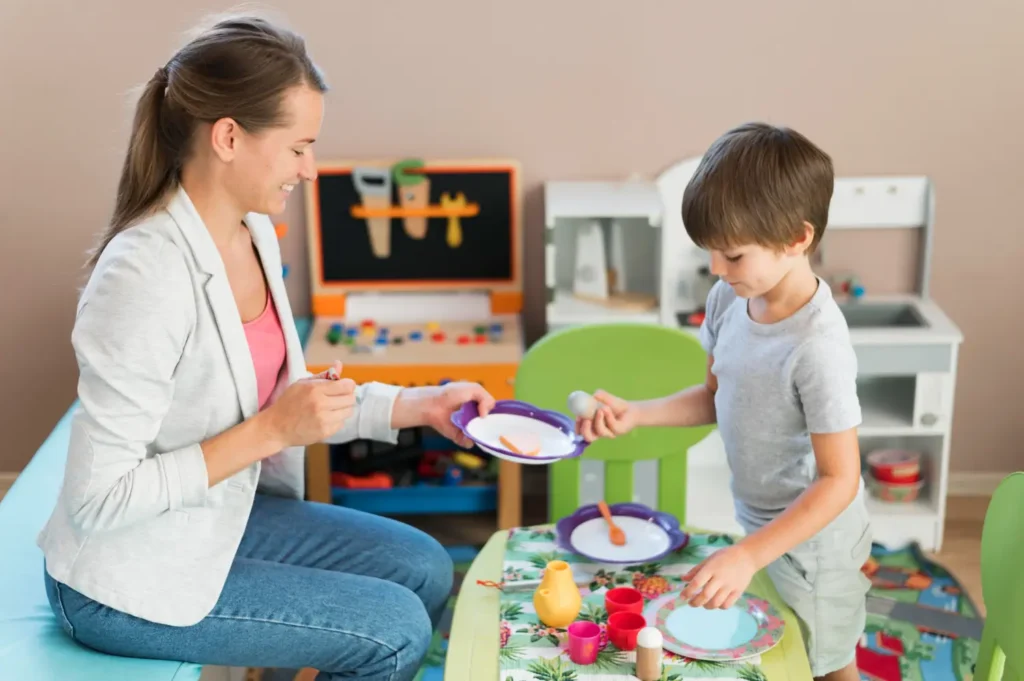Syllubus
Curriculum Outline
Welcome to the Path of Excellence in Montessori Education with a placement guarantee.
The Montessori Teacher Training curriculum at Sydney Montessori Teacher Training College is designed to provide educators with a comprehensive understanding of Montessori philosophy, child development, and the essential skills needed to foster a thriving Montessori classroom environment. Our curriculum combines theoretical knowledge with hands-on experience to ensure educators are well-prepared to guide children’s learning and development.

Montessori Philosophy & Methodology
- Introduction to Montessori Education
- History and evolution of the Montessori Method
- Comparison with traditional educational systems
Key Principles of Montessori Education
Absorbent mind, sensitive periods, and the importance of prepared environments.
Role of the Montessori Teacher
Facilitator of learning: observation, guidance, and providing structure.
Montessori Materials and Their Usage
Sensorial, practical life, language, mathematics, and cultural materials.
Respect for the Child
Fostering independence and encouraging curiosity
Child Psychology & Development (Ages 0-6)
Stages of Early Childhood Development
Cognitive, emotional, physical, and social development stages.
Understanding Sensitive Periods
Tailoring lessons to suit the sensitive periods of a child’s growth.
Brain Development and Learning
Neuroplasticity in early childhood and how Montessori methods aid brain development.
Child Observation Techniques
Systematic observation and record-keeping for personalized education.
Managing Child Behavior
Positive discipline strategies and conflict resolution in the classroom.


Curriculum & Materials for Montessori Classrooms
Practical Life Activities
Exercises in care for self, care for the environment, and grace and courtesy.
Sensorial Education
Activities for developing sensory discrimination, concentration, and cognitive skills.
Language Development
Introduction to phonetics, vocabulary building, reading, and writing
Mathematics Materials
Using hands-on materials to introduce numbers, counting, and arithmetic operations.
Cultural Education
Geography, science, art, and music activities for cultural awareness
Physical Education
Incorporating movement and physical development into daily activities.
Holistic Development of the Child
Emotional and Social Skills
Creating environments that support emotional intelligence and social interactions.
Cognitive Development
Stimulating intellectual growth through problem-solving and critical thinking activities.
Creative Expression
Integrating art, music, and storytelling into Montessori education
Developing Independence and Responsibility
Fostering self-reliance and self-discipline in young learners.


Montessori Classroom Management
Creating the Prepared Environment
Organizing the classroom for maximum learning and minimal distractions.
Mixed-Age Groups
Managing different age groups within one Montessori class.
Time Management and Lesson Planning
Creating lesson plans that allow freedom of movement while maintaining structure.
Assessment and Evaluation in Montessori
Non-traditional assessment methods to monitor progress without standardized tests.
Professional Skills for Montessori Educators
Communication with Parents
Conducting parent-teacher conferences and creating home-school collaboration.
Ethics in Montessori Teaching
Maintaining integrity, respect, and professionalism in the classroom.
Starting and Managing a Montessori School
Introduction to setting up a new Montessori school or managing an existing one.

Ready to embark on your journey as a Montessori educator?
Contact us today to learn more about our programs or to schedule a consultation with one of our admissions counselors
